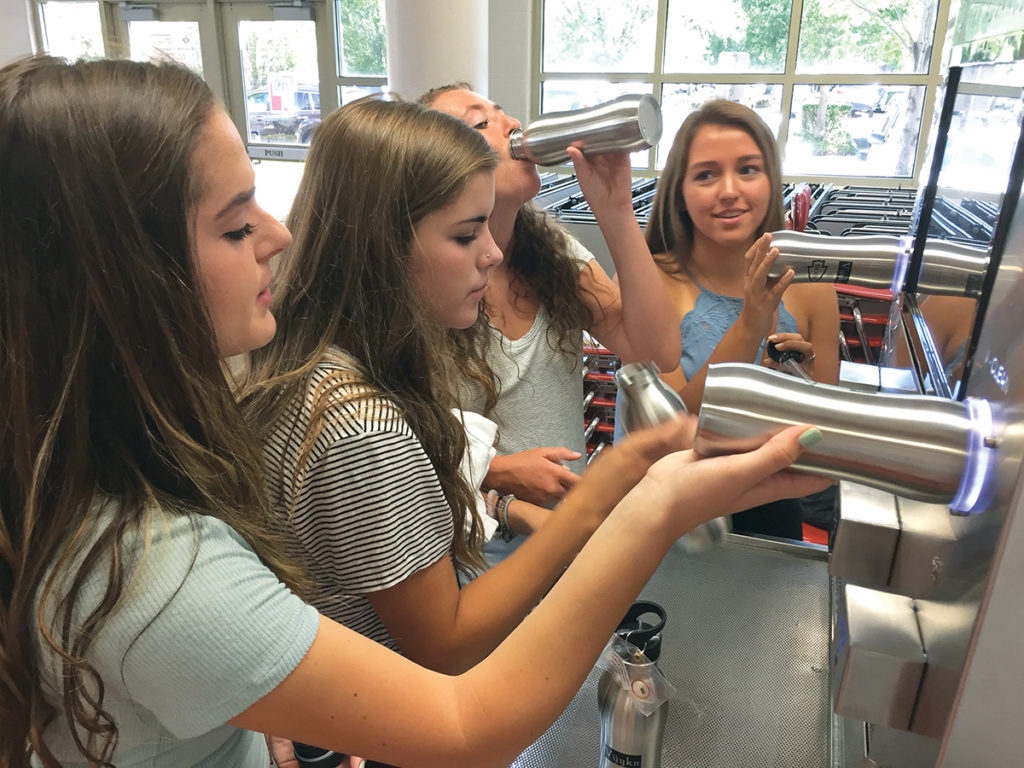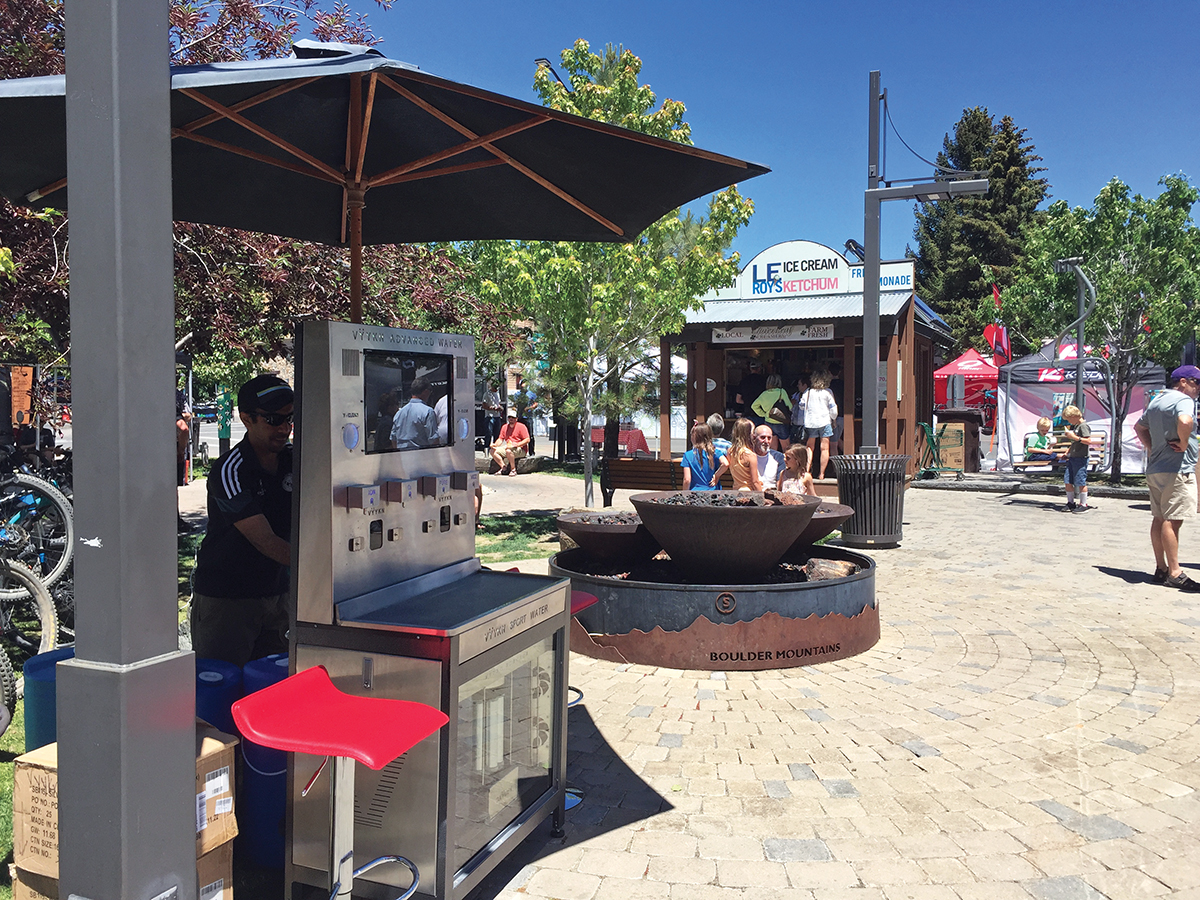Enter the offices of Vyykn, a company that hopes to revolutionize our relationship to drinking water, and one can’t help but be a little disoriented. In the entryway is a high tech vending machine—for lack of a better word—though this one is replete with sleek stainless steel panels, a touch screen that a customer doesn’t even have to touch to operate and cool blue lighting that if it does nothing else lends a futuristic sophistication to what is in simplest terms a water dispenser. In one work space that used to house a bank, one finds the requisite tech company ping pong table, however, this one is littered with small electronic parts, fixtures, tools, wiring, and an open laptop. Two programmers are diligently working there, constructing a component of the Vyykn system. Nearby, in the primary work space of Vyykn, there are computers, white couches, a station for product development, many more tools, and different versions of the company’s hydration “platform.” It is a surreal step into a business that could very well be in Palo Alto or Menlo Park. Curiously, it happens to be in downtown Ketchum, Idaho.
Steve Kuzara, the founder of Vyykn, is, as many of his peers in Silicon Valley would say, “swinging for the fences.” While some entrepreneurs might have an idea for a product and go after one specific market, Kuzara and Vyykn are going after several vertical markets, attempting to build what Nick Harman, Vyykn’s business development head, calls an “ecosystem” of hydration stations. This would be a network of water dispensing machines in airports, coffee shops, restaurants, gyms and public places at which subscribers can dispense highly filtered water, carbonated water, oxygen-infused water, and mineral laden, elevated-pH water.
“Man’s relationship with water is dysfunctional,” Kuzara told me. “Due to overpopulation and ‘progress,’ we have polluted most of our fresh water sources, and we are running out of fresh water. Our response to this is to package water in a toxic plastic container, ship all over the world and pay (on average) more than gasoline. This cannot be the end of the story. Vyykn plans to build the world’s first private global utility, delivering the most pure and trustworthy drinking water to the world. In the future, people will refer to water as what is in the toilet or what is used to wash our cars, clothes, or for agriculture. Vyykn is what you drink.”
Kuzara’s primary goal when starting the company was an environmental one: to reduce, and, in a perfect world, eliminate, the number of single serve plastic water bottles in the world. And there are a lot of them. According to the International Bottled Water Association, the 2014 U.S. revenues for bottled water were $14.2 billion, which equates to 11.7 billion gallons, or 36.3 gallons per person. The global market, at least in terms of volume, is double that
To move toward his goal, Kuzara began by creating web-connected hydration stations that dispense six-stage-filtered water, with the optional enhancements of infused oxygen, minerals, or carbon dioxide, into metal bottles. Each metal bottle comes with an RFID chip that tracks an individual’s water consumption (assuming one is drinking what’s dispensed). It is this microchip—eventually it will be a mobile phone software application—that prefigures a second, more ambitious health and wellness goal of the company, which according to Harman, “… is to modify our behavior (when it comes to water).”

Girls at Boise High School line up at the Vyykn station. Photo courtesy of Vyykn.
The health benefits of staying hydrated are well documented and range from effects on cardiovascular health, to weight loss, kidney health, and skin tone. Kuzara is also keenly concerned with the dramatic increases in diabetes and obesity in the U.S. While cause and effect are not definitive, the correlation of the rise of these health crises with the consumption of sugar-based sodas is startling. Kuzara believes that an innovative approach to consuming water might make a dent in these problems. An obvious place in which to do that is in the schools. To that end, Vyykn has partnered with Boise High School to deploy one of their hydration stations at the school. The company also provided 2,000 subscriptions to the students and teachers.
One strategy Vyykn employs in modifying our behavior towards drinking water is to “gameify” the process. With software tracking of consumption, Vyykn can create “leaderboards” in a corporate or school setting in which participants can see how their hydration compares with their peers. In effect, users compete to drink more water. Recently, Vyykn set up a TV monitor so that the workers building the Limelight Hotel in Ketchum could check in on their “hydration race” during breaks. Over at Boise High, the kids, as one might expect, enthusiastically embraced the game.
Each Vyykn subscriber—the company offers $30, $60, and $90 per year plans—has an account profile with his or her name, height, weight, and target water consumption per day. Subscriptions entitle users up to five liters (1.3 gallons per day). Each time a user dispenses water at a Vyykn station it is tracked and stored in a cloud-based database. Subscribers can opt in for alerts to a phone or computer to keep on pace for their target daily water consumption.
A second platform the company plans to provide is a “wellness” station. These will be similar to the standard hydration stations but will include a means to measure weight, heart rate, blood oxygen level—all while one’s water bottle is being filled. This, Harman told me, is a nod to the emphasis corporate America now places on wellness in the workplace. Each time a worker fills up a water bottle, this basic health data will be relayed in a HIPPA-compliant way to the company’s wellness director. Ultimately, it’s not hard to imagine this data being used to justify lower insurance premiums for a company or an individual.
A key determinant in the success of the company will surely be the extent to which it can develop networks of Vyykn hydration stations. Just as the value of a cellular system increases with more cell towers—in cell phone marketing speak, “coverage”—so too will be the utility of the Vyykn system improve as more stations dot a community. The company envisions having stations in restaurants and coffee shops, where customers can enjoy a “farm-to-table experience,” as Harman told me, in which customers know exactly what they are drinking. For every sommelier in a fine restaurant, Harman can imagine someone performing a similar function for water.
As it happened, Kuzara chose Ketchum as a place in which to prove his model. That choice surely was informed by the willing cooperation by the city of Ketchum and its mayor, Nina Jonas. “When Steve first told me of Vyykn, two elements caught my attention as a company that would be a good fit for Ketchum,” Jonas said. “Steve’s goals to reduce the heavy toll of single use plastic water bottles on the earth while simultaneously providing wellness to people (through hydration) strongly echo the values of our community. Also, Vyykn has the great potential to provide jobs not in the tourist and building sectors that will diversify Ketchum’s economy … It is this type of business sector diversification that Ketchum needs to support a vibrant community with jobs for full time residents.”
In addition to stations at the airport, the Wood River YMCA, and Zenergy Health Club and Spa, Vyykn plans to put five stations on city property, including the Town Square. “The City of Ketchum is contracting with Vyykn to provide water stations in locations that lack infrastructure completely or seasonally,” Jonas explained.
One of the advantages of Vyykn’s software and data-tracking approach is that the company can monitor in real-time the quality of the water going in and out of its stations. If there is a spike in an impurity, Vyykn will know it right away and exactly where on the system the problem is arising. As the citizens of Flint, Mich., will attest, the nation’s water infrastructure is aging, if not decrepit in some parts of the country. No doubt there are other Flint, Michigans out there. Kuzara told me that 96 percent of the municipalities in the U.S. are out of compliance with the Safe Drinking Water Act of 1972. It is also perhaps notable that the standard for water safety itself dates back 45 years.
Dig a little into Vyykn’s plans and it becomes obvious that this is no widget company. It’s at once a technology and environmental play with a network business model. Throw in the healthcare and the software as service components and it becomes clear that the company is, to say the least, ambitious in scope.
To the outsider, the challenge may seem daunting, both from a product and a customer behavior point of view. Building an entire ecosystem around an idea is not for the faint of heart. For someone like Kuzara, having that challenge before him, well, that’s the good stuff. As he said to me while taking a power drill to one of his nearly completed public stations, “Remember, Uber started with three cars.”


